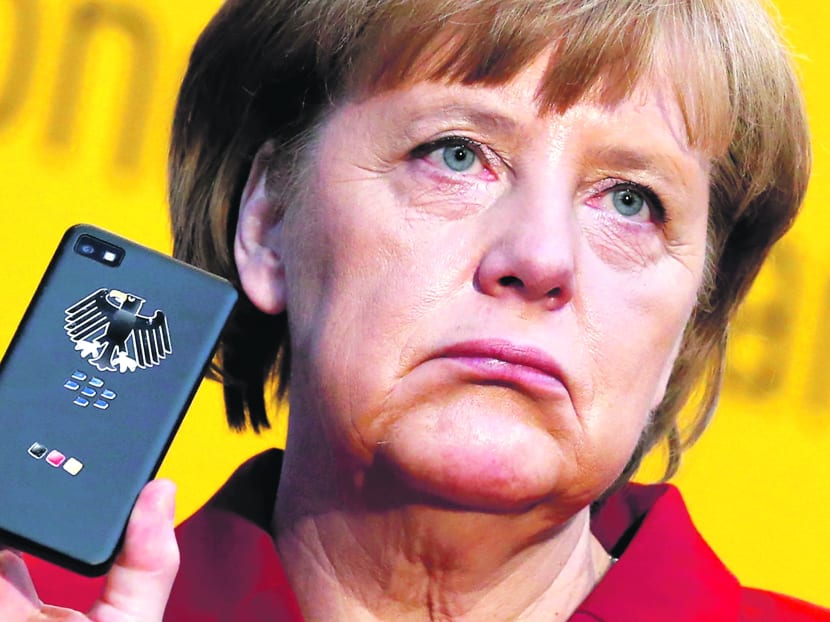France, Germany seek to sort out spying rules with US
BRUSSELS — The leaders of Germany and France have offered to hold talks with the United States in an effort to come up with mutually acceptable rules for surveillance operations, easing a trans-Atlantic spying dispute that has plunged relations between America and Europe to a low point.

Ms Merkel holding a BlackBerry Z10 smartphone that features high security Secusite software, used for governmental communication, in March. Germany said on Wednesday it had evidence that Ms Merkel’s phone had been monitored. Photo: Reuters
BRUSSELS — The leaders of Germany and France have offered to hold talks with the United States in an effort to come up with mutually acceptable rules for surveillance operations, easing a trans-Atlantic spying dispute that has plunged relations between America and Europe to a low point.
Members of the European Parliament’s civil liberties committee will fly to Washington on Monday for the talks and explore “possible legal remedies for EU citizens” resulting from the alleged surveillance, the committee said in a statement yesterday.
Berlin is also sending a separate delegation of staff from Chancellor Angela Merkel’s office and top intelligence officials to the US for talks, a German government spokesman said yesterday, without specifying a date.
Fury over reports that American intelligence had monitored Ms Merkel’s mobile phone had spread from Germany to other European countries a day earlier and prompted calls to suspend trade talks with the US.
The White House could soon face other irked heads of state and governments, as Britain’s The Guardian newspaper has said that it has obtained a confidential memo suggesting the National Security Agency was able to monitor 35 world leaders’ communications in 2006.
However, Prime Minister David Cameron yesterday made his strongest remarks on the subject yet, accusing former NSA intelligence contractor Edward Snowden and unnamed newspapers of assisting Britain’s enemies by helping them avoid surveillance by its intelligence services.
Speaking at news conference after a European Council meeting in Brussels, Mr Cameron said: “What Snowden is doing and, to an extent, what the newspapers are doing in helping him do what he is doing, is frankly signalling to people who mean to do us harm how to evade and avoid intelligence and surveillance and other techniques ... That is helping our enemies.”
Ms Merkel, seeking to rebuild trust among the long-standing allies, said yesterday that a pact should be agreed by the end of the year ending the kind of surveillance that was made public as part of the disclosure of documents harvested by Snowden.
The aim is to “come to a common understanding of the services between the United States and Germany and France so that we put down a framework for cooperation”, Ms Merkel said after European Union leaders ended a first day of talks.
In a further sign of a willingness to defuse the dispute, Ms Merkel said that the leaders meeting in Brussels had not talked about interrupting negotiations with the US to reach a landmark trade deal aimed at reducing tariffs and aligning regulations.
On Thursday, Ms Merkel had demanded that the US strike a “no-spying” agreement with Germany and France by the end of the year following accusations that the NSA had accessed tens of thousands of French phone records and monitored Ms Merkel’s private mobile phone.
Asked yesterday whether she wanted an apology from the US, Ms Merkel said: “The most important thing at this juncture is to find a basis for the future so that trust can be rebuilt.”
But she warned the US that “words will not be sufficient” to make amends, adding: “It’s become clear for the future that things have to change, and they have to change radically.”
She also suggested that the door had been left open to a possible suspension of an agreement with the US that allows it to track the finances of terrorist groups.
Lawmakers at the European Parliament voted earlier this week to suspend the agreement because of suspicions that the US authorities were tapping European citizens’ personal financial data.
Some European Union officials have also seized on the latest revelations about US snooping as a way to give new momentum to a fiercely contested proposal that could require American companies like Google and Yahoo to seek clearance from European officials before complying with US warrants seeking private data. AGENCIES






